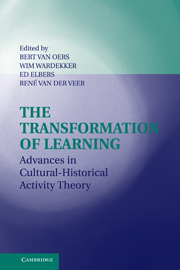Book contents
- Frontmatter
- Contents
- List of Contributors
- Preface
- INTRODUCTION
- SECTION ONE TENETS OF ACTIVITY THEORY
- Introduction to Section One: Exploring Vygotsky's Legacy: The Meaning of Mediation
- 2 Multiple Readings of Vygotsky
- 3 Exploring the Links between External and Internal Activity from a Cultural-Historical Perspective
- 4 Reflections on Points of Departure in the Development of Sociocultural and Activity Theory
- 5 Language in Cultural-Historical Perspective
- 6 The Formation Experiment in the Age of Hypermedia and Distance Learning
- 7 Constructivism and Meaning Construction
- 8 Subject, Subjectivity, and Development in Cultural-Historical Psychology
- SECTION TWO IDENTITY, DIVERSITY, AND INCLUSION
- SECTION THREE DYNAMICS OF ACTIVITY AND THE VARIATIONS OF LEARNING
- Index
- References
7 - Constructivism and Meaning Construction
Published online by Cambridge University Press: 25 August 2009
- Frontmatter
- Contents
- List of Contributors
- Preface
- INTRODUCTION
- SECTION ONE TENETS OF ACTIVITY THEORY
- Introduction to Section One: Exploring Vygotsky's Legacy: The Meaning of Mediation
- 2 Multiple Readings of Vygotsky
- 3 Exploring the Links between External and Internal Activity from a Cultural-Historical Perspective
- 4 Reflections on Points of Departure in the Development of Sociocultural and Activity Theory
- 5 Language in Cultural-Historical Perspective
- 6 The Formation Experiment in the Age of Hypermedia and Distance Learning
- 7 Constructivism and Meaning Construction
- 8 Subject, Subjectivity, and Development in Cultural-Historical Psychology
- SECTION TWO IDENTITY, DIVERSITY, AND INCLUSION
- SECTION THREE DYNAMICS OF ACTIVITY AND THE VARIATIONS OF LEARNING
- Index
- References
Summary
A Tai-chi-chuan apprentice follows the steps of the master in the beginning of his training. As he reaches a stage of proficiency, he creates his own interpretation of the movements proposed by his master. Being able to control the technique, he will reinvent the learned movements, adapting them to his own manner of interpretation. Without the initial context, he would not reach this stage of expertise. Experience made it possible to surpass the sociocultural determinism.
This chapter intends to analyze in some detail the example of the first paragraph. In its apparent simplicity, a series of complex questions is posed to the psychologist. How should we think about learning? What are the cognitive developmental processes? How should we define the influence of the context and the individual participation? Are we obliged to choose between an approach centered in the individual or the environment? My aim is to propose a solution to some of those questions, starting from the sociocultural theory. However, I think that it is important to establish my own theoretical position, although I cannot do it in a systematic form in this chapter. While I consider the conceptual ideas posed by Lev Vygotsky to be fundamental, as well as those advanced in contemporary developmental psychology by authors such as Scribner, Cole, Fogel, and Valsiner, I do not think that those positions are in conflict with the psychogenetic model proposed by Jean Piaget.
- Type
- Chapter
- Information
- The Transformation of LearningAdvances in Cultural-Historical Activity Theory, pp. 127 - 136Publisher: Cambridge University PressPrint publication year: 2008



